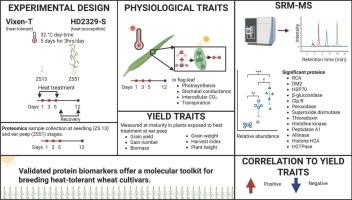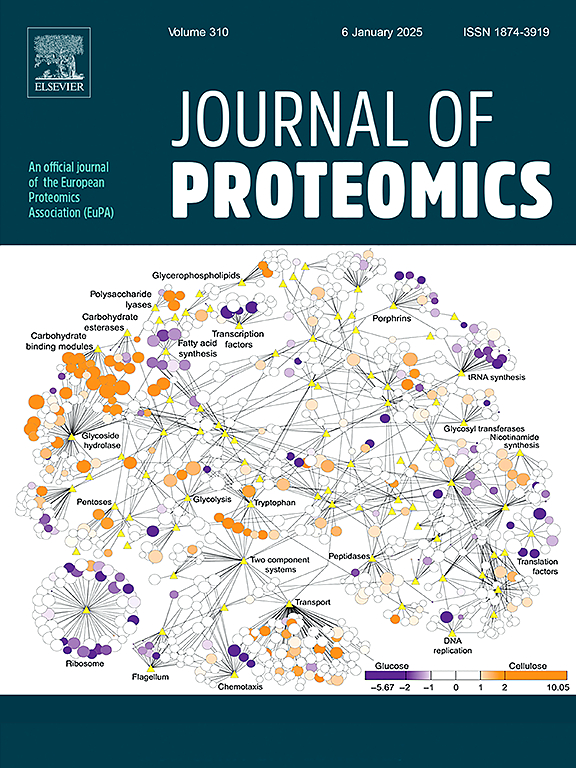Potential protein biomarkers for heat tolerance in wheat at seedling and ear peep stages
IF 2.8
2区 生物学
Q2 BIOCHEMICAL RESEARCH METHODS
引用次数: 0
Abstract
Heat stress is a major threat to global wheat (Triticum aestivum L.) production, adversely affecting crop yields and grain quality. Understanding wheat's heat tolerance mechanisms is crucial for developing resilient cultivars. This study used targeted proteomics to validate heat-induced changes to protein abundances in seedling and flag leaves of heat-tolerant (Vixen-T) and heat-sensitive (HD2329-S) wheat genotypes. Proteomics samples were collected on days 1, 3 and 5 of heat exposure (32/16 °C day/night for 3 hours per day over 5 days) and day 12 post-recovery. Flag leaf gas exchange was studied under heat treatment during ear peep and significant genotype × heat treatment interactions were observed for all traits. Significant protein abundance changes occurred under heat stress for 15 and 14 proteins at the seedling and ear peep stages, respectively. Two key proteins—DM2 domain-containing protein (r = 0.99) and Rubisco activase (r = 0.96)—showed consistent responses across both developmental stages. Redox homeostasis and protein chaperone pathways emerged as major contributors to wheat heat tolerance. These findings highlight critical protein biomarkers that can support breeding efforts to develop heat-tolerant wheat varieties, offering valuable strategies for sustaining wheat productivity under climate change.
Significance
This study identifies and validates novel protein biomarkers associated with heat tolerance in wheat. These proteins were discovered in our previous study in the flag leaves of four genotypes with contrasting heat responses (tolerant: RAJ3765, HD2932; susceptible: HD2329, HD2733) under short-term heat stress at the ear peep stage. These biomarkers were further validated in two genotypes (tolerant: Vixen; susceptible: HD2329) under short-term heat stress at both seedling and ear peep stages. The validated protein isoforms span key biological processes, including photosynthesis, redox regulation, chromatin remodelling, protein folding, and carbohydrate and secondary metabolism. This panel of protein biomarkers offers a novel molecular framework for breeding heat-tolerant wheat, providing a strategic avenue, utilising targeted proteomics, to sustain yield under rising temperatures.

小麦苗期和穗期耐热性的潜在蛋白质生物标记物。
热胁迫是全球小麦(Triticum aestivum L.)生产的主要威胁,对作物产量和粮食品质产生不利影响。了解小麦的耐热机制对培育抗热品种至关重要。本研究利用靶向蛋白质组学技术验证了耐热小麦(Vixen-T)和热敏小麦(HD2329-S)基因型幼苗和旗叶中蛋白质丰度的热诱导变化。在热暴露(32/16 °C 昼夜,每天3 小时,持续5 天)的第1、3和5天和恢复后的第12天收集蛋白质组学样本。对垂穗期旗叶气体交换进行了研究,各性状均观察到显著的基因型与热处理交互作用。在高温胁迫下,幼苗期和穗裂期有15种和14种蛋白质丰度发生显著变化。两个关键蛋白- dm2结构域蛋白(r = 0.99)和Rubisco激活酶(r = 0.96)-在两个发育阶段表现出一致的反应。氧化还原稳态和蛋白伴侣通路是小麦耐热性的主要贡献者。这些发现强调了可以支持培育耐热小麦品种的关键蛋白质生物标志物,为在气候变化下维持小麦产量提供了有价值的策略。意义:本研究鉴定并验证了小麦耐热性相关的新蛋白生物标志物。这些蛋白是在我们之前的研究中发现的,在四种基因型的旗叶中发现的,这些基因型在短时间热胁迫下具有不同的热反应(耐:RAJ3765, HD2932,敏感:HD2329, HD2733)。这些生物标志物在两种基因型(耐:Vixen;敏感:HD2329)在苗期和耳垂期的短期热胁迫下得到进一步验证。经过验证的蛋白质异构体跨越关键的生物过程,包括光合作用、氧化还原调节、染色质重塑、蛋白质折叠、碳水化合物和次生代谢。这组蛋白质生物标记物为培育耐热小麦提供了一个新的分子框架,提供了一个战略途径,利用靶向蛋白质组学,在气温上升的情况下保持产量。
本文章由计算机程序翻译,如有差异,请以英文原文为准。
求助全文
约1分钟内获得全文
求助全文
来源期刊

Journal of proteomics
生物-生化研究方法
CiteScore
7.10
自引率
3.00%
发文量
227
审稿时长
73 days
期刊介绍:
Journal of Proteomics is aimed at protein scientists and analytical chemists in the field of proteomics, biomarker discovery, protein analytics, plant proteomics, microbial and animal proteomics, human studies, tissue imaging by mass spectrometry, non-conventional and non-model organism proteomics, and protein bioinformatics. The journal welcomes papers in new and upcoming areas such as metabolomics, genomics, systems biology, toxicogenomics, pharmacoproteomics.
Journal of Proteomics unifies both fundamental scientists and clinicians, and includes translational research. Suggestions for reviews, webinars and thematic issues are welcome.
 求助内容:
求助内容: 应助结果提醒方式:
应助结果提醒方式:


